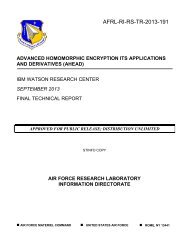EN100-web
EN100-web
EN100-web
Create successful ePaper yourself
Turn your PDF publications into a flip-book with our unique Google optimized e-Paper software.
Special theme: Scientific Data Sharing and Re-use<br />
Figure 1: Purposes of Metadata and their<br />
Relationships<br />
Information Format) which covers persons,<br />
organisations, projects, products<br />
(including datasets), publications,<br />
patents, facilities, equipment, funding<br />
and – most importantly – the relationships<br />
between them expressed in a form<br />
of first order logic with both role and<br />
temporal attributes [2].<br />
The detailed processing metadata are<br />
typically specific to a research domain<br />
or even an individual experiment or<br />
observation method. They include<br />
schema information to connect software<br />
to data and also parameters necessary<br />
for correct data processing such as<br />
precision, accuracy or calibration information.<br />
Metadata in RDA: As indicated above,<br />
metadata are used extensively in all<br />
aspects of RDA activity. However there<br />
are four groups that are specialising in<br />
metadata. They are: MIG (Metadata<br />
Interest Group): the overarching longterm<br />
group to discuss metadata and to<br />
work with Working Groups (WGs ) of<br />
18-month duration doing specific tasks;<br />
MSDWG (Metadata Standards<br />
Directory WG): developing a directory<br />
of metadata standards so a user can look<br />
up appropriate standards for their purpose<br />
and/or research domain; DICIG<br />
(Data in Context IG): developing<br />
through use cases the requirements<br />
within and across research domains for<br />
contextual metadata; RDPIG (Research<br />
Data Provenance IG): concentrating on<br />
providing provenance information for<br />
datasets. These groups arose spontaneously<br />
‘bottom-up’ but are now coordinating<br />
among themselves to form a<br />
strong metadata presence in RDA.<br />
Moving Forward<br />
The metadata groups have agreed on a<br />
joint forward plan. It consists of the following<br />
steps:<br />
1. Collect use cases: a form has been<br />
prepared and is available on the <strong>web</strong>site<br />
together with a use case example<br />
both written and on the form;<br />
2. Collect metadata ‘standards’ into the<br />
MSDWG directory;<br />
3. Analyse content of (1) and (2) to produce<br />
a superset list of all elements<br />
required and a subset list of common<br />
elements by purpose – so called<br />
‘packages’ of metadata elements:<br />
4. Test those ‘packages’ with research<br />
domain groups in RDA (we have<br />
already volunteers!) and adjust based<br />
on feedback;<br />
5. Present the ‘packages’ to the TAB<br />
(Technical Advisory Board) of RDA<br />
for authorising as recommendations<br />
from RDA to the community.<br />
The metadata groups plan to meet<br />
jointly, and jointly with chairs of other<br />
groups, at RDA Plenary 5 in San Diego.<br />
You are welcome to join RDA, register<br />
for P5 and be involved.<br />
Acknowledgements<br />
The authors acknowledge the contributions<br />
of colleagues in the metadata<br />
groups of RDA and particularly: Jane<br />
Greenberg, Alex Ball, Bridget Almas,<br />
Sayeed Choudhury, David Durbin.<br />
Links:<br />
http://dublincore.org/metadata-basics/<br />
http://dublincore.org/<br />
http://ckan.org/<br />
http://www.eurocris.org/Index.php?<br />
page=CERIFreleases&t=1<br />
https://rd-alliance.org/groups/<br />
metadata-ig.html<br />
https://rd-alliance.org/groups/<br />
metadata-standards-directory-workinggroup.html<br />
https://rd-alliance.org/groups/datacontext-ig.html<br />
https://rd-alliance.org/groups/researchdata-provenance.html<br />
References:<br />
[1] K.G. Jeffery, A. Asserson, N.<br />
Houssos, B. Jörg: “A 3-layer model for<br />
Metadata”, in CAMP-4-DATA<br />
Workshop, proc. International<br />
Conference on Dublin Core and<br />
Metadata Applications, Lisbon<br />
September 2013.<br />
http://dcevents.dublincore.org/IntConf/<br />
dc-2013/schedConf/presentations?<br />
searchField=&searchMatch=&search=<br />
&track=32<br />
[2] K.G. Jeffery, N. Houssos, B. Jörg,<br />
A. Asserson: “Research Information<br />
Management: The CERIF Approach”,<br />
Int. J. Metadata, Semantics and<br />
Ontologies, Vol. 9, No. 1, pp 5-14<br />
2014.<br />
Please contact:<br />
Keith G. Jeffery<br />
Keith G. Jeffery Consultants, UK<br />
E-mail:<br />
Keith.Jeffery@keithgjefferyconsultants.co.uk<br />
24<br />
ERCIM NEWS 100 January 2015



